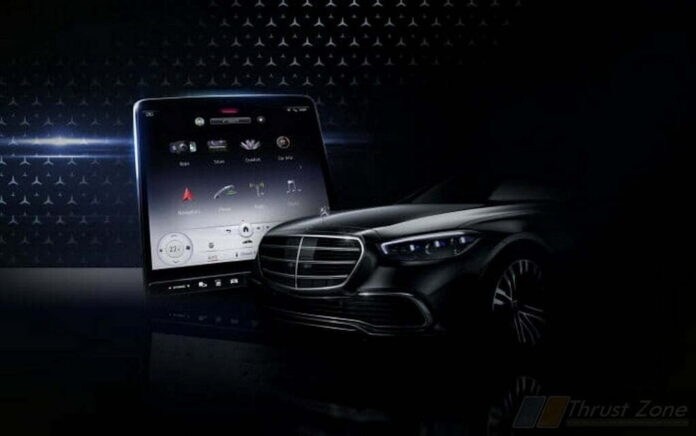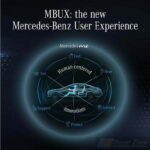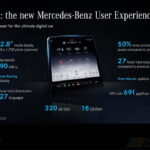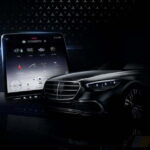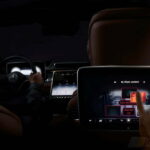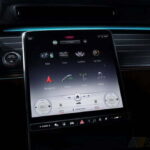Mercedes-Benz is expanding its digital information platform with an additional news format on the new S-Class, which celebrates its digital world premiere in September. In a total of three episodes starting 8 July 2020, Meet the S-Class DIGITAL will provide the first insights into some of the groundbreaking innovations that will ensure the new luxury saloon further cements its leading position as the best car in the world.
The Meet the S-Class DIGITAL news format likewise consists of moderated shows with studio interviews as well as reports from location and test tracks. Each show is accompanied by in-depth information in the form of videos, graphics, press texts and images for download. There is also the chance to chat with Mercedes-Benz experts.
Have a quick look the presentation on the way to the office, and discuss minor changes with your assistant by telephone conference? Or while away the long journey to your holiday home with the latest online films, while your brother next to you listens to his favourite audiobook? Whether managers or children – in an S-Class, and especially in the main markets of China and the USA, the boss often sits in the rear. Accordingly Mercedes-Benz has systematically designed the new edition of its flagship model with the rear in mind. One example: passengers in the rear have the same extensive Infotainment and comfort features as the driver and front passenger. They have access to up to three touchscreens and a variety of different control options such as MBUX Interior Assist or the voice control assistant “Hey Mercedes”.
No other innovation in recent years has so radically changed the operation of a Mercedes-Benz as MBUX (Mercedes-Benz User Experience). The second generation of this learn-capable system now has its debut in the new S-Class. The vehicle interior is even more digital and intelligent, as both the hardware and software have made great strides: brilliant displays on up to five large screens, in part with OLED technology, make control of vehicle and comfort functions even easier.
The human factor is always the central consideration. The possibilities for personalisation and intuitive operation have become far more extensive. This certainly applies in the rear, but also for the driver: for example, the new 3D driver display allows a spatial view at the touch of a button for the first time. A real three-dimensional effect is achieved without having to wear 3D glasses.
The voice assistant “Hey Mercedes” is capable of even more dialogue. Certain actions can be performed even without the activation keyword “Hey Mercedes”, for example. These include accepting a telephone call or displaying the navigation map. “Hey Mercedes” can now also explain where the first-aid kit is located, or how to connect a smartphone via Bluetooth.
Alongside the classic entry of a PIN, a new authentication method ensures a high level of security. Fingerprint, face and voice recognition are combined. This allows access to individual settings or verification of digital payment processes from the vehicle.
However, the unique feature of MBUX is its networking with a wide range of vehicle systems and sensor data. For example, the exit warning function in the S-Class now uses cameras to recognise that an occupant wants to leave the vehicle. If another road user is approaching in the blind spot, the active ambient lighting becomes part of the exit warning system and flashes red. MBUX Interior Assist checks whether the child seat is correctly attached to the front passenger seat. The driver’s attention level is also monitored. The driver is warned by ATTENTION ASSIST if there are signs of microsleep.
The latest screen technologies and MBUX for all occupants
Media display in portrait format as a visual highlight
On request this is available with OLED technology and haptic feedback
The driver display allows real three-dimensional effect without having to wear 3D glasses
Up to three screens in the rear
Screen content can be quickly and easily shared with other passengers
Selection and amendment of navigation destinations is possible from the rear seats
Extensive personalisation
By scanning a QR code with the Mercedes App, the vehicle is automatically connected to the Mercedes me account
Personal preferences such as a favourite radio station and preselected settings can be transferred to any seat via the personal Mercedes me profile
Up to seven different profiles are possible in the vehicle
The ambient lighting can be individually set by remote configuration, e.g. from home
As the profiles can now be stored in the Cloud as part of Mercedes me, they can also be used in other Mercedes-Benz vehicles with the new MBUX generation
Alongside entry of the Mercedes me PIN, new biometric and interconnected authentication functions ensure a high level of security. These are fingerprint, face and voice recognition.
The driver display is optionally available with two cameras. These are used e.g. for face recognition
Simplified, intuitive operation:
depending on the equipment level, MBUX Interior Assist recognises up to 20 control wishes
New safety functions include recognition of an unattached child seat on the front passenger seat and the blind spot warning. This detects the intention to leave the vehicle by the movements of the occupant. This allows an even earlier warning of other road users and obstacles at the side of the vehicle
New convenience functions include prepositioning of the driver’s seat and outside mirrors according to body size, and operation of the rear roller blind by glancing over the shoulder. The sliding sunroof can also be operated by hand gestures
The voice assistant “Hey Mercedes” listens even more carefully, and understands the occupants even better:
“Hey Mercedes” can also be controlled from the rear. Several microphones help to tell the system which seat the voice is coming from. Flashing ambient lighting identifies the current speaker
If the driver says “I’m tired”, an activation programm of ENERGIZING comfort control is started. The same sentence from the rear starts a wellbeing programme.
“Hey Mercedes” explains functions (“Explore me”), and e.g. helps when a smartphone is to be connected via Bluetooth, or explains where the first-aid kit can be found
The activation keyword “Hey Mercedes” is no longer necessary for certain applications. An incoming call can be taken direct with “Accept call”, for example
“Hey Mercedes” now supports 27 languages with natural language understanding (NLU). This makes natural interaction on a wide range of topics possible
The new Chit-Chat and knowledge domain supplies the right answer to many questions – even questions about animal noises or general knowledge are answered
A dialogue with a real person can also be started.
Domestic systems and home appliances can also be linked to the vehicle and voice-controlled thanks to the Smart Home function
Two different head-up displays (HUDs) are available on request
The larger HUD provides augmented reality (AR) content
When navigating, for example, animated turn-off arrows (“fishbones”) are virtually projected onto the road lane. For the assistance functions, information from e.g. Active Distance Assist is shown.
Not only the switch icons in the door panels allow seat adjustments to be made – they are also accessible via the display screens. Operation of comfort functions such as seat heating or massage is also possible by voice control
Puristic, luxurious design as an intuitive experience:
The driver display and media display offer a comprehensive aesthetic experience
The appearance of the screens can be individualised with a choice of four display styles (Discreet, Sporty, Exclusive, Classic) and three modes (Navigation, Assistance, Service)
The number of classic controls has been greatly reduced: 27 fewer hardkeys (mechanical switches) than in the preceding model
As an addition to touching and swiping, voice control and natural hand gestures, gaze control extends the operating options
However, key functions such as the lights or windscreen wipers can still be operated directly. The climate control panel is permanently at the lower edge of the display
The user interface (UI) follows human intuition
MBUX Interior Assist responds to gestures and movements
“Hey Mercedes” responds to speech
In the large head-up display, relevant information is projected into the driver’s field of vision at a virtual distance of approx. ten metres
Coloured augmented reality content can be integrated into this (see above)
As this is superimposed directly onto reality, the result is directly perceptible information that is important for the current driving situation
Two different head-up displays (HUDs) are available on request, one of them an innovative variant with a particularly large image. The aperture angle of the display is 10° horizontal and 5° vertical, and the image appears virtually at a distance of 10 metres. This display area corresponds to a monitor with a 77-inch diagonal. The AR-HUD provides a great deal of augmented reality content for driving assistance systems and navigation information. For the driver this blends into the surroundings ahead of the vehicle, and can therefore contribute to further reduced distraction. The image-forming unit (DMD, digital mirror device by Texas Instruments) consists of a high-resolution matrix of 1.3 mill. individual mirrors and a highly efficient light source. The technology is also used by beamers in cinemas. In the S-Class it is used by Mercedes-Benz for the first time to generate images in the head-up display.
3D driver display: An impression of spatial depth is created when the eyes of a viewer perceive different perspective views of an object in the display. In this innovative auto-stereoscopic display, this is achieved by the sophisticated combination of a conventional LCD display with a special pixel structure and a controllable LCD aperture grille. What is known as a barrier mask is positioned a few millimetres in front of the LCD. It is so precisely adjusted to the head position of the viewer that the left and right eye see different pixels of the LCD. This creates the desired impression of depth. A stereo camera system is integrated into the display. This is used to precisely determine the eye position of the viewer. Thanks to methods developed by Mercedes-Benz to adapt distances and a very low-latency system configuration, the driver enjoys a wide range of free movement. The image in the driver display is continuously adjusted.
MBUX Interior Assist: Using cameras in the overhead control panel and learning algorithms, MBUX Interior Assist recognises and anticipates the wishes and intentions of the occupants. It does this by interpreting head direction, hand movements and body language, and responds with corresponding vehicle functions. For example, if the driver looks over his/her shoulder towards the rear window, Interior Assist automatically opens the sunblind. If the driver is looking for something on the front passenger seat in the dark, it automatically switches the light on. Merely looking at one of the outside mirrors is enough to allow adjustment, without having to select it first. Natural hand movements are also recognised, and the driver or passengers can open the sliding sunroof touch-free. Preferred functions can be accessed with the help of the favourites gesture (hand with the index and middle finger spread in a V-shape). The driver and passengers can link personal favourites with the system. As well as enhancing operating convenience, MBUX Interior Assist improves safety. It checks whether a child seat on the front passenger seat is correctly attached, for example.
OLED technology: The abbreviation stands for Organic Light Emitting Diode. In contrast to LCD technology, an OLED display consists of several organic layers applied to a plastic substrate. In the S-Class the OLED display is located behind a glass facing, and in combination with the actuators and pressure sensors behind it, it provides a comprehensive control and display experience. Evaluation of the pressure exerted and haptic confirmation of touch commands makes extended functionalities possible. OLED panels emit light when subjected to an electric current, and unlike an LCD they do not require external background lighting. Power is only consumed where pixels light up. Among other benefits, this ensures a better black level and even stronger contrasts. When showing typical video sequences, OLED technology has an up to 30 percent lower energy consumption than LCD technology.
Voice assistant “Hey Mercedes”: Conventional voice control systems in cars call for certain fixed commands from their users. Because it understands natural language, “Hey Mercedes” listens to almost every word and understands practically any sentence relating to infotainment sector and vehicle operation in 27 languages. Indirect speech is also recognised, for instance if the user says “I am cold” instead of the clear command “Temperature in footwell 24 degrees” in order to operate the climate control for the footwell. The voice control is also capable of learning. On the one hand it tunes into the user and their voice and also understands non-native speakers better; on the other hand the software models on the server learn new buzzwords or changing use of language with time. The system also no longer answers stereotypically, but varies in the dialogue output too. The fundamental way the language assistant operates: the voice input is freed from background noises, compressed and transmitted. Both the head unit in the vehicle and the server evaluate the data and send a reply. The system decides which reply is the most likely, then within a few seconds the reply/reaction follows. This means that the voice assistant also answers if there is no connectivity.


